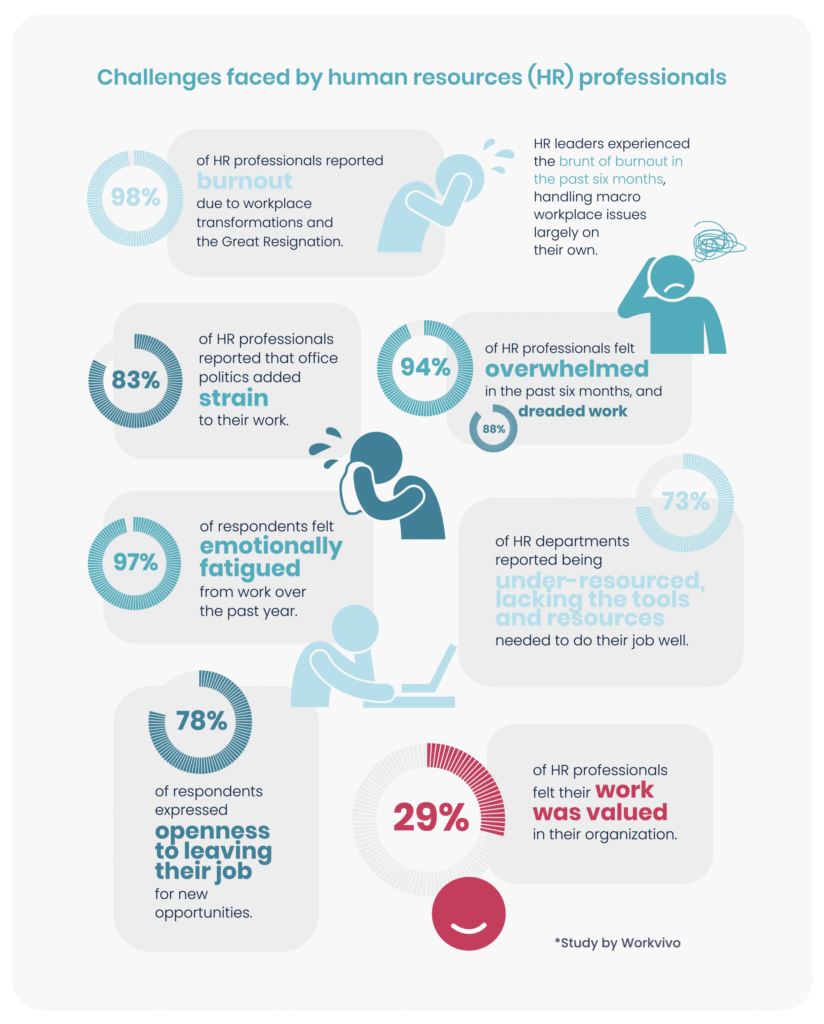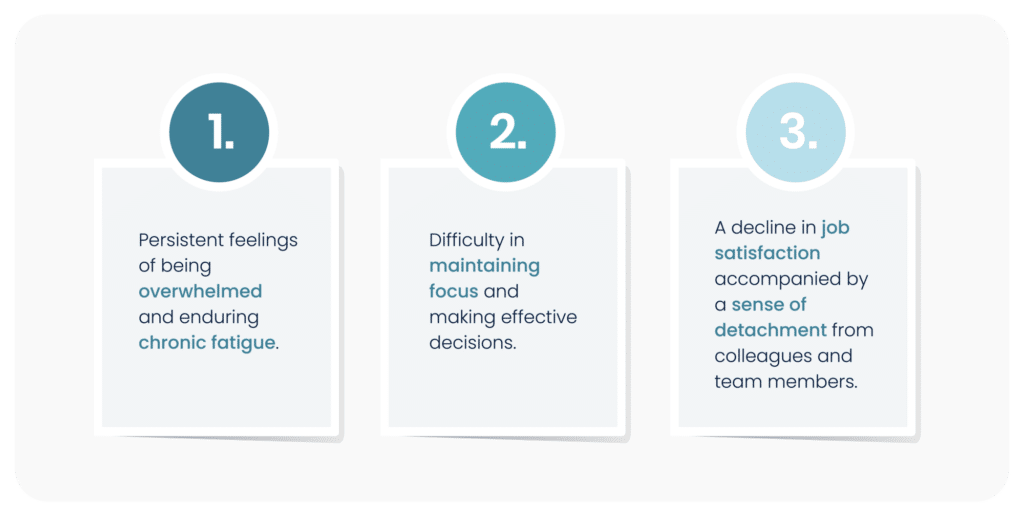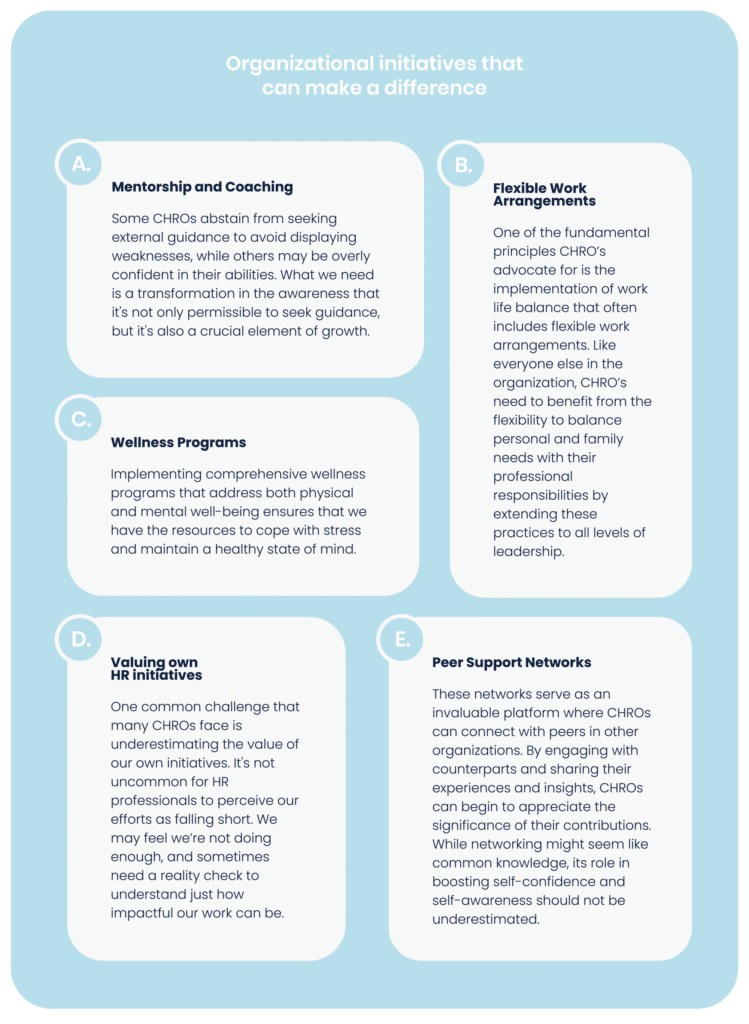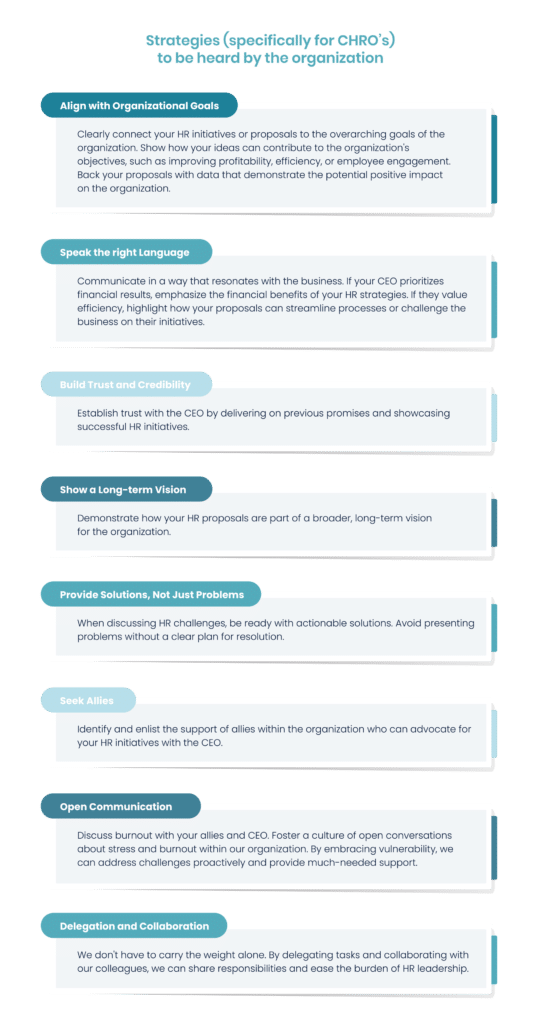Contents
As we embrace the ever-evolving world of modern business, the role of HR Proffesionals has taken on a whole new dimension beyond administering “resources”; we are or should be at the heart of sculpting organizational culture, ensuring employee well-being, and charting strategic workforce planning. Yet, behind the scenes, there’s a silent struggle we face, one that’s becoming all too apparent across various industries. Together with several current and former CHROs (Chief Human Resources Officer), we would like to discuss a concerning trend: burnout for HR professionals. Let’s uncover why this issue is so pressing, and more importantly, what we can do about it.
98% of HR Professionals are Burned Out, Study Shows
A study by Workvivo, published in Forbes, sheds light on the challenges faced by human resources (HR) professionals, particularly concerning burnout in the HR department. The study surveyed over 520 HR professionals in the United States and U.K., revealing alarming trends. The past two years have been incredibly stressful for HR leaders.

The Landscape of HR Leadership is Ever-Changing
Over the past decade, organizations have been navigating an intricate web of responsibilities. The economic landscape has become increasingly dynamic, presenting a multitude of challenges. Just when it seemed that we had seen it all, the COVID-19 pandemic struck, reshaping the corporate world. Today, companies and, more specifically, CHROs find themselves grappling with a new set of psychological challenges due to the ongoing economic crisis, the war in Europe and Ukraine, and the disruptive influence of AI in the workplace.
The past two years have only added to the burdens on CHROs. We had to adapt to the rise of remote work, intensify their focus on employee mental health, address the growing call for diversity, equity, and inclusion, and seamlessly integrate AI into HR processes. It has indeed been quite the journey, and the quest for balance remains a continuous struggle.
Moreover, we HR professionals are acutely aware of the psychological toll these challenges exact on individuals and the workplace. While an untrained observer may not consider the long-term effects on employee mental health and general well-being, we bear the weight of this responsibility. Self-reflection, often seen as a strength, can turn into a vulnerability in these situations because of the enormity of these psychological responsibilities. The toll on our own well-being, as we strive to safeguard the well-being of others, is an aspect that is too often overlooked.
Recognizing the Signs of Burnout
As we diligently labor to protect the well-being of others, the toll on our own mental and emotional health frequently remains unnoticed. By shining a spotlight on the distinct challenges that HR leaders encounter while striving to balance our own well-being and dedication to the organization, we can bring awareness to some specific CHRO struggles.
While the signs of burnout are universally relevant, it’s crucial for us to develop the ability to identify these telltale indicators in ourselves. Some common signs of burnout include:

By recognizing these signs, we can proactively address potential burnout early on ensuring our ability to make a meaningful impact on the organization overall.
Navigating Burnout: Strategies for CHROs
As HR Leaders, we must confront burnout head-on. It’s not uncommon for General Managers to prioritize profit centers over HR especially in times of crisis. They may label CHROs as experts in the field while disregarding their advice when it comes to changing their own behavior.
Furthermore, the business often has to focus on short-term gains, dismissing the long-term effects of HR efforts, which revolve around the well-being of individuals—far from quick price changes that yield immediate revenue. It’s essential that we acknowledge the significance of mental health and well-being in our HR efforts. Here are some strategies specifically for these professionals to be heard by the organization:
Organizational Trust in CHROs: What Matters Most
The key is not merely about seeking support. It’s about cultivating an environment of trust and genuine understanding of the human element. It’s about fostering mutual respect, and recognizing the value of each perspective.

Navigating Uncertain Times Ahead.
As we peek into the future, the HR leadership role is set to evolve even further. We’ll face new challenges and opportunities, and it’ll require us to be agile and adaptable like never before. But here’s the thing – if we’re burnt out, we won’t be able to navigate these uncertain waters effectively. It’s a matter of our own well-being. We need to acknowledge its existence, break the stigma, and create a safe space for open conversations about the pressures we face. Burnout is not exclusive to HR leaders; it affects professionals across various roles and industries. By coming together and sharing our experiences, we can not only help ourselves but the whole organization. It’s about building an understanding that lifts us all up, one where being heard, trusted, and mutually respected by the business is a fundamental part of the equation.
Words from a former CHRO
It falls to the CHRO to take the lead in getting the CEO and the leadership team truly invested in a culture of trust where health and wellbeing can be discussed respectfully. Such investment takes time to build. When CHROs find themselves nearing burn-out, they can feel overwhelmed by the many challenges and find it difficult to focus on what is most immediately required.
This difficulty in choosing appropriate focus among all the incoming demands is often made worse by a belief among many CHROs that they must put everyone else’s needs before their own, and so they deplete their energy even further.
CHROs who find themselves in this position can break free from these traps by asking themselves this one simple question: what is the one most impactful thing I can do right now? This takes the weight off all the perceived expectations and gives them back a sense of control and forward motion.
The Interplay Between Business Needs and Human Resources Capabilities
As mentioned in the article, we are currently witnessing a significant tension between the necessity for efficient business decisions, especially crucial in times of crisis, and their implementation by HR departments as the operational backbone. This tension manifests in several layers, impacting its key players differently.
- Operational Challenges and Empathy: HR professionals, understanding market decisions, also value the emotional and psychological well-being of employees. Ignoring employee welfare for short-term cost savings can lead to increased absenteeism and turnover.
- Moral Dilemma: HR managers face internal conflicts when business decisions clash with their moral obligations, potentially leading to psychological distress and even depression.
- Personal Strain on HR Professionals: HR leaders often feel isolated in their roles, especially at higher levels, where sharing personal challenges is limited by the pressure to maintain reputation. This lack of exchange can start a negative spiral.
Empowering HR through Support and Coaching
Besides self-help measures, it’s crucial to provide HR leaders with sparring partners and opportunities for dialogue. Participation in conferences or networking events can help recalibrate their perspectives, making them realize they’re not alone. This new understanding can alleviate fear and inspire confidence.
Moreover, offering professional coaching to HR leaders enables them to channel their reflective skills effectively, preventing psychological overload through better daily management.
HR professionals facing these challenges must learn to detach from burdensome issues through discussions with peers or professional coaches. Business executives should also provide a psychologically safe environment to discuss these matters, ensuring the company’s successful future.
Closing Note for Encouraging Coaching
As an experienced coach and HR Executive, I understand the nuances and pressures of HR roles. I believe that professional coaching can be a transformative tool for HR professionals to navigate these complex challenges. It’s an invitation to explore new perspectives, strategies, and personal growth, paving the way for not just individual well-being but also for the sustained success of the organization. As HR leaders we should increasingly leverage this approach to fortify ourselves during these challenging times.




